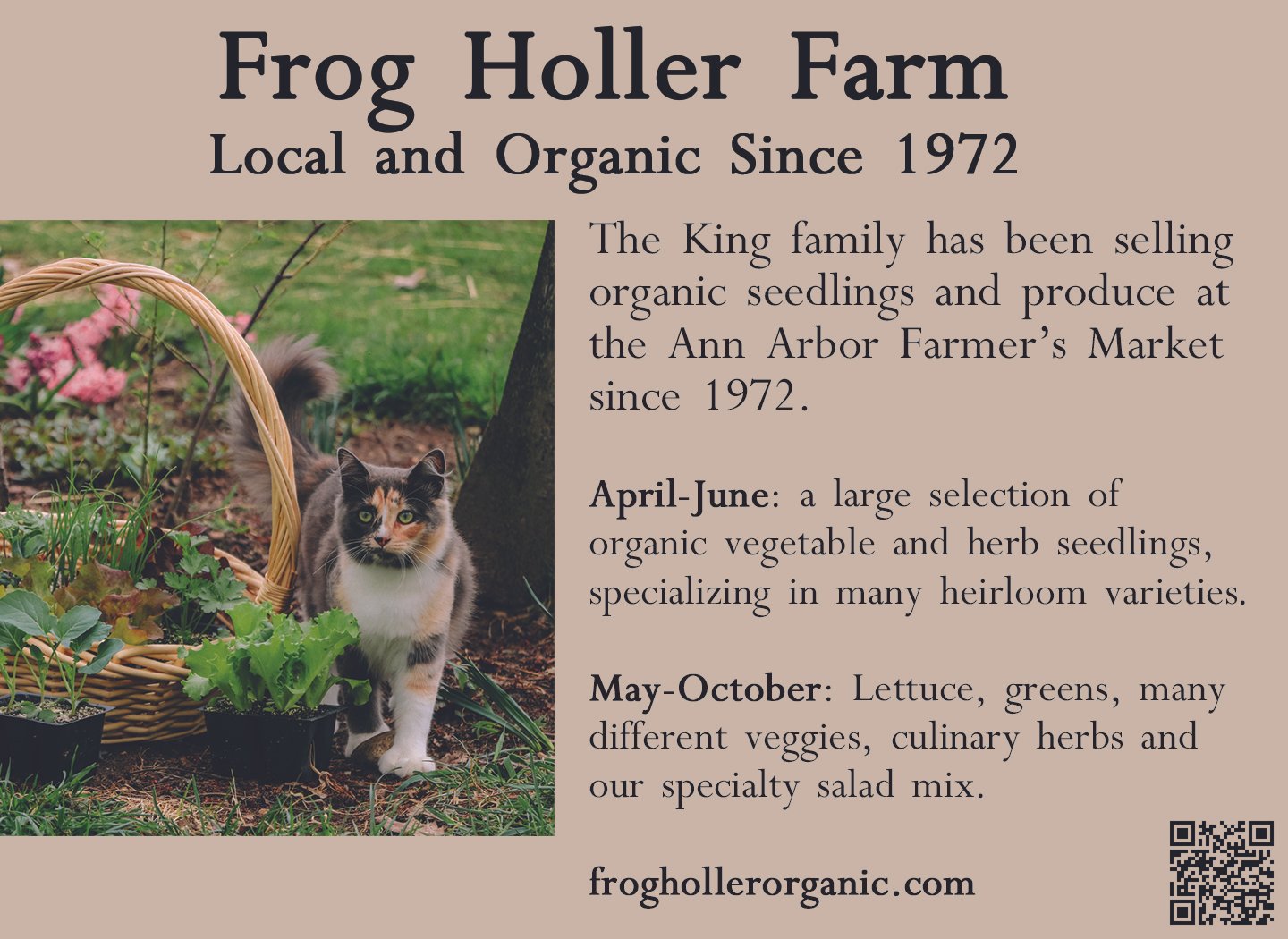By Hilary Nichols
Ann Arbor does summer well. This town comes alive with outdoor music from June to September, but each summer the local musicians and music lovers know that to wind-up the summer, Holler Fest is the place to be.
Holler Fest is a musical heart’s happy place. This three-day music festival is the favorite feel-good gathering of the season. It is held on the fourth weekend in August annually at Frog Holler Farm. Nearly 80 acts, and an audience that adores them, flock to this farmland turned festival grounds for this annual tradition. Established bands and new combinations of talented friends take to the five stages that are spread across the hills and hollows, in the woods, and tucked into a well-worn, but much-loved cabin. The cabin is very acoustic for smaller, more intimate sets. Squeezed in, knee to knee, fans sway and swoon for their favorite bands in this romantic little room. “People love to play in the cabin. It is so intimate. The sound of the stone walls is so special,” Cathy King, the matriarch of the King Family, owners of Frog Holler Farm, shared with me. “The musicians want to come back every year. Joe Riley was at the very first gathering. He was so friendly and warm. He has played every fest but one since.”
Together with her sons Edwin, Kenny, and Billy King, and daughter-in-law Emily Foley, Cathy hosts the festival while running their small-scale organic farm. “We work together on the farm and on the festival. It is fluid; we all pitch in and just do what needs to be done since we all live on the property.” This has been an all-hands-on deck operation since the festival started in 2007.
“Inspired by music festivals up north, Billy and Kenny King planned a big party at Frog Holler Farm to celebrate the King family’s 35 years on the land, …” is how the event is introduced on their website. Their neighbor Tom Hines came through to help put up their first stage, and he and his family have been contributing in countless ways ever since. Hines mows the grounds all summer, recently clearing a new area to expand camping into their “Enchanted Peninsula” area as the festival has grown.
Now upward of 100 volunteers pitch-in over the event weekend. Thirty or so more volunteers are dedicated to the production throughout the year. “We certainly could not do it without them,” Cathy says of her volunteer crew. “This festival has taken on a life of its own with all the good energy of our team.” The impact of the team is felt. Their kitchen manager Angie Martin introduced the “free store” which is a well-loved aspect of the event. Ceramicist Doug Worthington first brought his Doug’s Mugs to sell and soon became the vending manager. Tom Huber came initially in 2008 as a fan with his family in tow, and soon enough, they all became indispensable volunteers. “Tom is a real builder. He led a team of volunteers to build our kitchen,” said Cathy. Tom’s family all come the week before, camp, and bring food for the volunteers. His wife Edith leads the clean-up team with their buckets and brooms. “We call them the bucket and broom brigade.” The two families mix their talents musically, too. Tom Huber with his daughter Donya and younger son Kaden collaborated with Billy King in their band, Eyes Unclouded.
Cathy’s late husband Ken King, “always thought of himself as a musician.” He would host barn parties and dances on the property.
Set in the Irish Hills, the property is so hilly and wooded they were initially told it was unsuitable for farming. That didn’t stop Ken and Cathy, along with their partners, from purchasing the piece of property in 1972 as a place to grow vegetables for their restaurant Indian Summer, on State Street in Ann Arbor. Soon after however, the partners began to devote themselves to their disparate undertakings. The Kings focused on Frog Holler Organic Farm, becoming the first organic growers at the Ann Arbor Farmers Market. While their partner, Rick Peshkin, went on to create what is now Ann Arbor’s premiere produce wholesaler, Frog Holler Produce, and also The Produce Station.
The King family still operates the small-scale Frog Holler Organic vegetable farm on a two-acre patch on the property. “We had to start from scratch on this beautiful but abandoned piece of land,” Cathy King told me. They sell their produce at the Ann Arbor Farmers’ Market each week. “Our farm sales support the festival. It makes no sense at all, but we never make any sense,” she declared. Financially the festival might not make a lot of sense, but that has never been the purpose of this wonderful affair. Cathy explained, “The farm is beautiful. It makes no sense not to share it.” And share it they have. Last year there were nearly 2000 in attendance, with the musicians, volunteers, day visitors, and weekend campers tucked into all corners of the land.
Just 35 minutes from Ann Arbor in Brooklyn Michigan, the festival is simple to attend as a day visitor, but last summer I set up my tent on the hill for the weekend, with a perch to really witness how the festival flows. Townies and bandmates were deep in conversation in the green room that was filled with good cheer, a couple of couches and always coffee, tea, and snacks. The stage manager, Barry Lonik, brought the next act up and the announcer, John Bommarito, kept the crowd hyped while the sound system and lighting was carefully cajoled to play over the large lawn. The level of professionalism was uncanny for this small family festival. It was clear that everyone wanted to lend a hand.
On stage, headlining acts were interspersed with old timers strumming their fiddles and harmonizing to the classics. The audience sat in their own camp chairs in the natural amphitheater singing along and hooting and hollering at all the heart and happiness that was amplified throughout the day. Parents frolicked across the lawn, chasing toddlers and dancing amongst the grandparents and teenagers, while old friends stopped for hugs and continued toward their next show. Everyone there was clearly connected through the love of music, and the Ann Arbor small-town tribe. This was a chance to come together to play, d participate, and celebrate the simple joys of life around the campfire: music, friends, family, and cooperation. The setting was simply idyllic. “Everyone really responds to the family feeling and the vibe. We do get people telling us that they feel at home… it’s a community feeling,” King affirmed.
Each afternoon we witnessed neighbor Tom Hines deliver a large log in the claws of his excavator. His grandson Sullivan assisted as they situated it to standing in the middle of the fire ring. The four-foot-high tree stump stayed lit in this Swedish Torch tradition throughout the night, billowing its fragrant smoke and sparks across the grounds. We gathered close for warmth and for drumming with Sundance DiDomenico and Paul Militello, before moving on as another show beckoned us back to another stage. Last year I was wowed by Donya Kiana’s hauntingly elegant act and Anne Erlewine’s emotionally true singer-songwriter show in the rustic farmhouse. Cassie Catania’s late night aerial show on the hill was awe inspiring, and the crowd-pleasing big band, Jive Colossus spilled beyond the second stage and kept the crowd on their feet dancing and bouncing along to their world funk sounds.
However, it was Billy King belting out his heartfelt tunes from his own back yard that really brought me to tears. Along with his band—Prime Time and The Headliners, he delivered kindhearted vocals, made more impactful at full volume. The crowd pressed forward and pumped their fists in the air, shouting along in unison. As I took it all in, it became undeniably clear, this is real—as real as it gets.
Don’t miss the Holler Fest this summer August 23-25th. Learn more at hollerfest.com.




































































































































































































I recently went twice to see A Complete Unknown, the biopic about Bob Dylan’s early rise to stardom from 1961 until 1965 with Timothee Chalamet as Dylan. Both times the audience was mostly age fifty and up. I am eighty-five—two years older than Dylan. We are members of what is called, misleadingly, “The Silent Generation.” The postwar generation are Boomers, who are associated with the upheavals of the 1960s, but as Dylan puts it in his memoir, Chronicles, One, “I had very little in common with, and knew even less about, a generation that I was supposed to be the voice of.” The well-known movers of that era—Dylan, Warhol, Ginsberg, Baez, Beatles, Rolling Stones, and many others—are prewar or war babies.